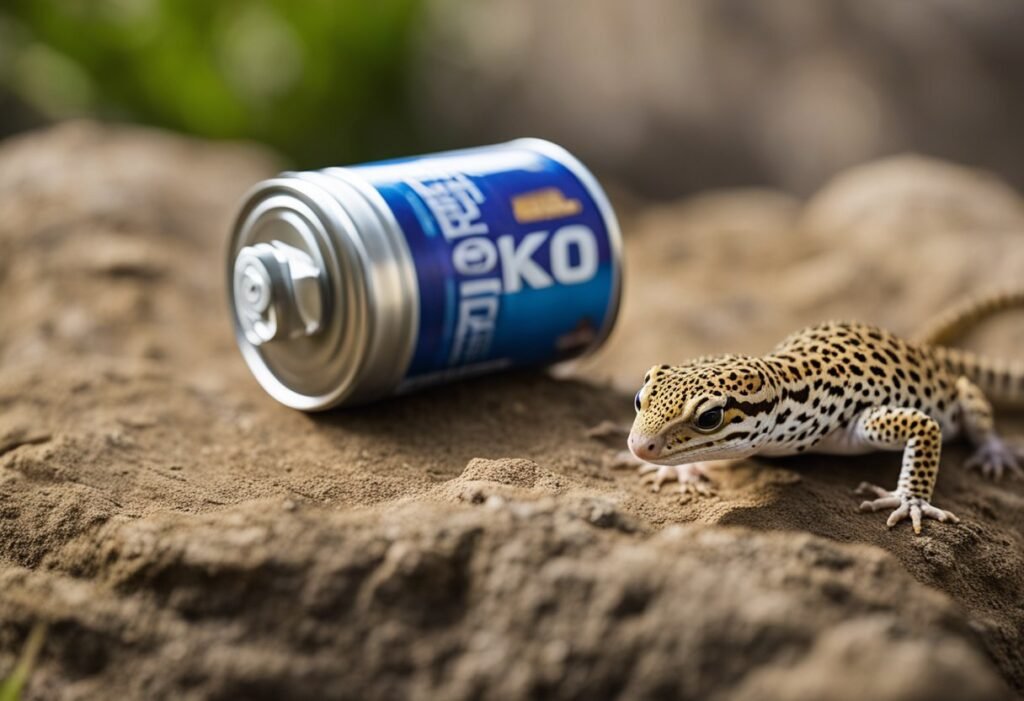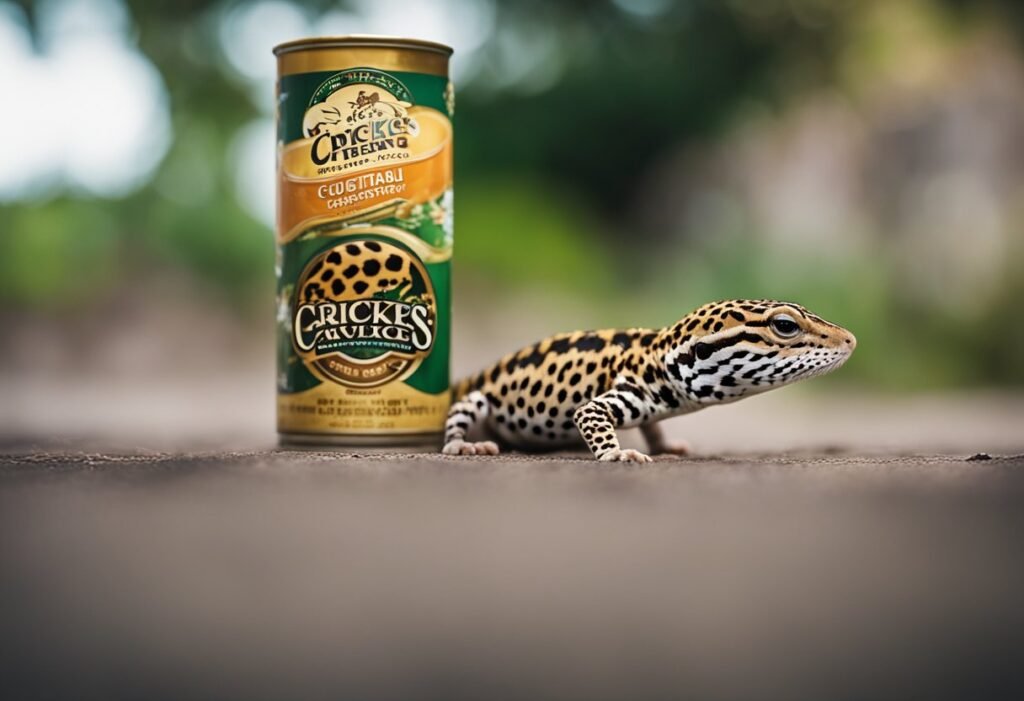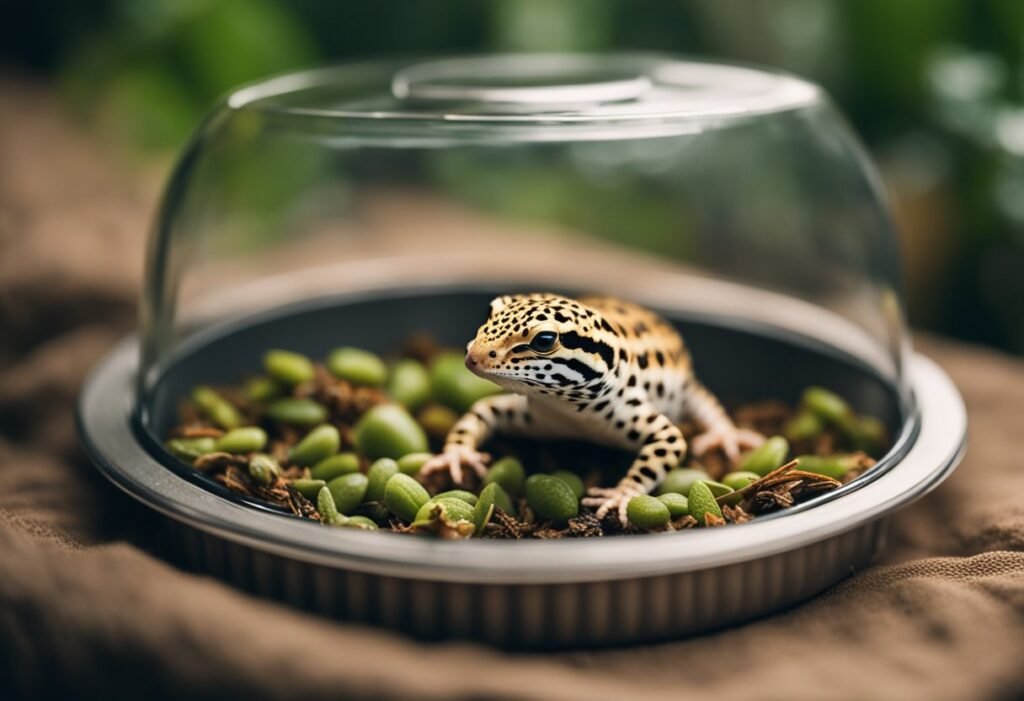Leopard geckos are fascinating creatures that make great pets. As a responsible pet owner, it is important to provide them with a balanced and nutritious diet. While live insects are usually the preferred food for leopard geckos, canned crickets are a convenient alternative that many pet owners consider.
The question arises, can leopard geckos eat canned crickets? The answer is yes, they can. Canned crickets are a good source of protein and nutrients for leopard geckos, and they are readily available at most pet stores. However, it is important to note that canned crickets should not be the sole source of food for leopard geckos, and they should be used as a supplement to a varied diet that includes live insects.
When considering feeding your leopard gecko canned crickets, it is important to ensure that the crickets are of high quality and free from any harmful additives or preservatives. It is also important to monitor your gecko’s health and behavior to ensure that they are tolerating the canned crickets well. With proper care and attention, canned crickets can be a safe and convenient addition to your leopard gecko’s diet.
Leopard Gecko Dietary Basics

As responsible pet owners, it’s crucial to understand the dietary needs of our leopard geckos. In this section, we’ll cover the basics of their nutritional requirements and the options available for feeding them.
Nutritional Requirements
Leopard geckos are insectivores, which means they require a diet high in protein and low in fat. In the wild, they primarily feed on insects such as crickets, mealworms, and waxworms. It’s essential to provide a varied diet to ensure they receive all the necessary nutrients.
In addition to protein, leopard geckos require calcium and vitamin D3 for strong bones and overall health. These nutrients are crucial for preventing metabolic bone disease, a common condition in captive reptiles.
Natural Prey vs. Commercial Food Options
While live insects are the most natural and preferred food for leopard geckos, there are commercial food options available, including canned crickets. However, it’s important to note that canned crickets may not provide the same nutritional value as live insects.
Live insects are more nutritious, as they contain more moisture and are easier to digest. Canned crickets, on the other hand, are processed and lack the moisture and nutrients of live insects. They may also contain preservatives and other additives that could be harmful to your gecko.
In conclusion, while canned crickets can be used as a supplement to live insects, they should not be the primary food source for your leopard gecko. It’s best to provide a varied diet of live insects, gut-loaded with calcium and vitamin D3, to ensure their optimal health and wellbeing.
Understanding Canned Crickets

What Are Canned Crickets?
Canned crickets are a convenient and readily available source of nutrition for leopard geckos. They are essentially dried crickets that have been canned for easy storage and transport. These crickets are usually cooked and sterilized before being canned to ensure that they are safe for consumption.
One advantage of canned crickets is that they can be stored for longer periods of time compared to live crickets. This makes them a great option for pet owners who want to provide their leopard geckos with a consistent source of nutrition without having to worry about feeding live crickets all the time.
Nutritional Value of Canned Crickets
Canned crickets are a great source of protein and other essential nutrients for leopard geckos. They are rich in calcium, which is important for maintaining healthy bones and preventing metabolic bone disease. They also contain other important nutrients such as phosphorus, magnesium, and potassium.
However, it is important to note that canned crickets may not be as nutritious as live crickets. This is because the canning process may reduce the nutritional value of the crickets. Additionally, some brands of canned crickets may contain preservatives or other additives that could be harmful to leopard geckos.
Overall, canned crickets can be a good option for leopard gecko owners who want to provide their pets with a convenient and consistent source of nutrition. However, it is important to choose a high-quality brand and to supplement your pet’s diet with other nutritious foods to ensure that they are getting all the nutrients they need.
Feeding Leopard Geckos Canned Crickets

Pros and Cons
Canned crickets are a convenient option for feeding leopard geckos. They are readily available year-round and can be stored for long periods without the need for live prey maintenance. However, there are some drawbacks to feeding canned crickets. They may lack some of the nutrients found in live prey, and some geckos may not recognize them as food, leading to a decreased appetite.
How to Feed Canned Crickets
When feeding canned crickets, it is important to ensure they are of high quality and free from any mold or contamination. We recommend checking the expiration date before purchasing and storing them in a cool, dry place. To serve, we suggest placing them in a shallow dish or feeding bowl and offering them to your gecko with feeding tongs.
Frequency and Portion Control
While canned crickets can be a convenient option, they should not be the sole source of food for your leopard gecko. We recommend offering a variety of live prey, such as mealworms and dubia roaches, to ensure a balanced diet. When feeding canned crickets, we suggest offering them as a supplement to live prey no more than once or twice a week. Portion control is also important, as overfeeding can lead to obesity and other health issues. We recommend offering no more than 2-3 crickets per feeding session.
Overall, canned crickets can be a convenient option for feeding leopard geckos, but should not be the sole source of food. By following proper storage, serving, and portion control guidelines, they can be a beneficial addition to a varied diet.
Health Considerations
Potential Health Risks
When it comes to feeding leopard geckos canned crickets, there are some potential health risks that need to be considered. One of the main concerns is the risk of bacterial contamination. Canned crickets have a higher risk of bacterial contamination compared to live crickets, which can lead to serious health problems for your leopard gecko.
Another potential health risk of feeding canned crickets is the risk of impaction. Canned crickets are often coated in a gel-like substance to keep them fresh, which can cause blockages in your leopard gecko’s digestive system if consumed in large quantities.
Signs of Nutritional Deficiencies
While canned crickets can be a convenient option for feeding your leopard gecko, it is important to keep in mind that they may not provide all of the necessary nutrients that your gecko needs to stay healthy. Some signs of nutritional deficiencies to watch out for include:
- Weight loss
- Lack of appetite
- Weakness
- Lethargy
- Poor growth
If you notice any of these signs in your leopard gecko, it may be a good idea to switch to a more varied diet that includes live insects and other food sources.
Overall, while canned crickets may be a convenient option for feeding your leopard gecko, it is important to consider the potential health risks and ensure that your gecko is getting all of the necessary nutrients in their diet.
Safe Feeding Practices
Hygiene and Food Preparation
When feeding canned crickets to leopard geckos, it is important to maintain good hygiene practices to prevent the spread of disease and ensure the health of your pet. Always wash your hands thoroughly before handling the food or your pet, and clean any surfaces or utensils used in food preparation.
It is also important to ensure that the canned crickets are fresh and free of mold or other contaminants. Check the expiration date before purchasing and inspect the contents of the can before feeding. If there are any signs of spoilage or contamination, discard the can and do not feed the crickets to your pet.
Supplementing Canned Crickets
While canned crickets can be a convenient and nutritious food source for leopard geckos, they should not be the sole component of their diet. It is important to supplement canned crickets with other foods such as live insects and vegetables to ensure a balanced diet.
Additionally, canned crickets may not provide all of the necessary nutrients and vitamins that leopard geckos require. Consider supplementing their diet with calcium and vitamin D3 to support healthy bone growth and overall health.
By following these safe feeding practices and supplementing canned crickets with other foods and nutrients, you can ensure the health and well-being of your leopard gecko.
Alternatives to Canned Crickets
If you’re looking for alternatives to canned crickets for your leopard gecko, there are a variety of options available. Here are some live prey options and other commercial foods to consider.
Live Prey Options
- Mealworms – Mealworms are a popular and nutritious option for leopard geckos. They are readily available at most pet stores and are easy to keep as they can be stored in the refrigerator for several weeks. However, it’s important to note that mealworms have a tough exoskeleton that can be difficult for some geckos to digest, so they should be fed in moderation.
- Dubia Roaches – Dubia roaches are another great option for leopard geckos. They are high in protein and low in fat, making them a nutritious choice. They are also easy to keep and can be purchased in various sizes to accommodate different age groups of geckos.
- Crickets – Live crickets are a staple food for many reptiles, including leopard geckos. They are high in protein and easy to find at most pet stores. However, it’s important to note that crickets can be noisy and have a tendency to escape, so they may not be the best option for all gecko owners.
Other Commercial Foods
- Repashy Superfoods – Repashy Superfoods are a popular commercial food option for leopard geckos. They come in a variety of flavors and are formulated to provide a balanced diet for your gecko. They are easy to prepare and can be stored in the refrigerator for several days.
- Pangea Fruit Mix – Pangea Fruit Mix is a popular commercial food option for geckos that prefer a fruit-based diet. It is made with real fruit and is high in vitamins and minerals. It can be served wet or dry and is easy to prepare.
- Zoo Med Can O’ Worms – If you’re looking for a canned food option, Zoo Med Can O’ Worms is a popular choice. It contains a variety of worms, including mealworms, superworms, and waxworms, and is a convenient option for gecko owners who don’t want to deal with live prey. However, it’s important to note that canned foods should be fed in moderation and should not be the sole source of nutrition for your gecko.
Overall, there are plenty of alternatives to canned crickets for leopard geckos. It’s important to provide a varied diet to ensure that your gecko is getting all of the nutrients they need to thrive.
Frequently Asked Questions

What are the best dietary options for leopard geckos?
Leopard geckos are insectivores and require a diet that is high in protein and low in fat. Some of the best dietary options for leopard geckos include crickets, mealworms, and dubia roaches. It is important to provide a varied diet to ensure that your leopard gecko receives all the necessary nutrients.
Are earthworms a suitable food for leopard geckos?
Earthworms can be a suitable food for leopard geckos, but they should be fed in moderation. Earthworms are high in fat and can lead to obesity if overfed. It is recommended to feed earthworms as an occasional treat.
Is it safe for leopard geckos to consume mealworms?
Mealworms are safe for leopard geckos to consume, but they should not be the sole source of food. Mealworms are high in chitin, which can be difficult for leopard geckos to digest. It is recommended to feed mealworms in moderation and to gut-load them before feeding to increase their nutritional value.
What alternative foods can I offer my leopard gecko besides crickets?
Leopard geckos can be offered a variety of alternative foods besides crickets, such as dubia roaches, waxworms, and superworms. It is important to research the nutritional value of each food item before feeding to ensure that your leopard gecko receives a balanced diet.
Can leopard geckos be fed dead insects, and are there any risks?
Leopard geckos can be fed dead insects, but it is important to ensure that the insects are fresh and have not been exposed to any harmful chemicals or pesticides. Feeding dead insects can also increase the risk of impaction, so it is recommended to feed live insects whenever possible.
What do leopard geckos naturally eat in their wild habitat?
Leopard geckos naturally feed on a variety of insects, such as crickets, beetles, and grasshoppers. They also consume small lizards and spiders. It is important to mimic their natural diet as closely as possible when feeding them in captivity.





